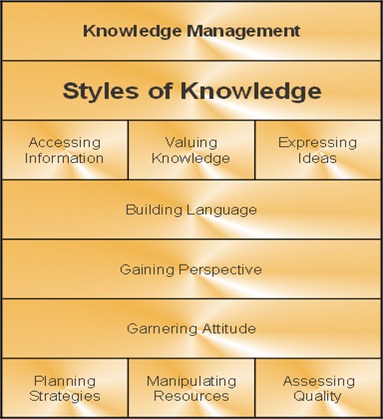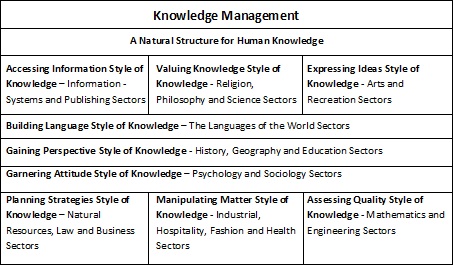Published on
Teaching as Knowledge Management

In the past the social world controlled the virtual world because we all lived in relative isolation. Today the Internet has interconnected everyone in a virtual world that is reshaping our social world. The contemporary approach to educations is a misfit in this context because it was designed for an era of books and buildings. Modern technology does not fit this model very well. So we need a new model for education that will fit the new realities of a technical world.
The Structure of Knowledge
This new model of education must be boundless. Its building will not be bricks and mortar, but a comprehensive structure of collective human knowledge. Instead of abstract classification, this knowledge would be organized in terms of the way it is used (as shown in the table). Styles of knowledge are divided into sectors, each sector is divided into occupational, disciplinary and professional specializations; each, in turn, divided into services provided by those specializations.
The Learning Process
Human knowledge was produced by learning. The process of learning is a natural function of the brain and may be described as accessing information, valuing knowledge, expressing ideas, building language, gaining perspective, garnering attitude, planning strategies, manipulating resources, and assessing quality. We build our personal systems through this process. The process is perpetual. It happens randomly or it can be used proactively.
Project-Based Learning / Project-Based E-Learning
Education systems of the future can be built on “the structure of knowledge” by creating learning projects around the services we provide (and products we produce) in our everyday lives. Projects are the most realistic way to learn. The numbers of projects that can be created are infinite and they should be customized to meet the needs of the learners. Projects can easily be computerized for e-learning and easily accessible databases can be developed. Projects are structured consistently using the learning process, so learners will inherently learn how to learn as they carry out the projects.
Portfolios / E-Portfolios
Projects are the most meaningful way to organize learning. Students keep track of their learning activities by developing portfolios of their work. Evaluation of the process takes precedent over evaluation of the outcomes. In fact, as we continuously improve process, outcomes automatically become more improved and consistent. Diversity becomes transparent and education equalizes for everyone. Anyone can learn anywhere. It is just a matter of constructing projects to meet the needs and circumstances of the learner. Of course, learners can use all the latest technology to enhance their learning. Portfolios can easily be computerized for e-learning.
Knowledge Management / Teaching
Teaching becomes a profession of knowledge management. Teachers use technology to design projects and communicate with students on site or off site. They create knowledge systems of projects. They use the knowledge systems for collaboration with students and with other teachers. Teachers become professionals. How to teach becomes a science and takes precedent over what is taught. Education moves into the twenty-first century.




